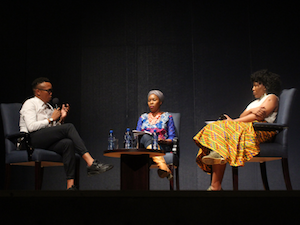“If you talk to a man in a language he understands, that goes to his head. If you talk to him in his language, that goes to his heart.” – Nelson Mandela
Having a leading global language as one’s home language can make one insensitive to the importance of other people’s languages. I love travelling and have had the nous to acquire an adequate number of phrases of genial greeting, polite request and gratitude to signal that I was born after the golden age of the British Empire. But secretly I know that in most of the places to which I choose to go, there will be someone who can help me in English.
Setshwano Setshogo, research director of the Broadcast Research Council (BRC), recently shared with me a presentation that she had written, entitled The Importance of Language. It was prefaced by a quote from the U.S. author, Rita Mae Brown, “Language is the road map of a culture. It tells you where its people come from and where they are going.”
Early in the presentation, Setshwano highlights the inadequacy of simply bundling groups of languages together, and points out that while the so-called Nguni people have similarities in their languages, they come from different tribes and have different cultures. (We should really confine the description Nguni to those rather handsome and hardy cattle.) Similarly, she stresses that Sotho, Tswana and Pedi languages have similarities in their languages but the speakers of these languages are different and come from different tribes. In the presentation, Setshwano then expands on the culture and traditions of the nine tribes in South Africa to underline her point that we “can not group people on our media systems and try to understand then as people if we do not separate them out and code the languages differently”.
By analogy, I thought how inadequate I would think a classification which grouped English, Afrikaans, Portuguese and Dutch together as languages of ‘European extraction’. How much texture would we lose in understanding those people?
In the quest for marketing efficiencies, we have been satisfied to group speakers of the isiZulu, isiXhosa, isiSwati, isiNdebele, Xitsonga and Tshivenda languages together as Nguni speakers; likewise, we clump Sesotho, Setswana and Sepedi speakers into a Sotho category.
Talk radio conversation
According to the South African Advertising Research Foundation (SAARF) website, this was the common and accepted practice from 1994 until 2000 to use four easy groupings: English/Other, Afrikaans/Both, Nguni/Other and Sotho/Both. From SAARF AMPS 2001, all 11 official languages were made available electronically. Subsequently the language questions were refined to capture the language spoken most often at home, as well as any other languages spoken at home. From 2003A report, the language breakdowns provided unduplicated data. While the detail was available to us, my planning memories are of simply regularly using the grouped languages as a default.
A day or two after I had gone through Setshwano’s presentation, by chance I heard a discussion about language on 702. Azania Mosaka was talking to one of the Ruth First Fellows, Nolwazi Tusini, who, earlier in the week, had delivered her memorial lecture, ‘The ’80s kids: A story of collaboration as disruption’ at the University of Witwatersrand.
For this, Tusini had researched the experiences of the first black children to attend previously segregated schools after the end of apartheid. She described them as the “first guinea pig black bodies to experience a desegregated school system, and by implication a desegregated South Africa”. While these youngsters were breaking barriers and proving their worth, there were some insidious prices to be paid. One of these was in terms of language. Tusini spoke about how the “’80’s cohorts”, now established in their lives had been encouraged by the schools to prioritise English. Letters were sent to their parents, asking them to focus on using English at home to help the youngsters develop proficiency in it.
Opportunity to open eyes
The expressions of sadness and loss by the young adults who had undergone this process were most disturbing to hear. Tusini recounted the embarrassment and frustration the young adults feel because they know that they lack proficiency in their mother tongues. Some felt anger and resentment towards their parents for sending them to schools where they had effectively lost their language. Another spoke about having to learn her mother tongue as an adult, and how she had struggled with her identity. The loss of one’s mother tongue was alienating, making people felt like outsiders in their “hoods” and even in their extended families.
Particularly harrowing for me was an account given about starting to dream in English. Tusini also raised question “When your mother can no longer speak to her grandchildren because you sent them to a ‘good school’, for whom does the rainbow shine?” This discussion certainly struck a chord with listeners, who responded with their own stories of loss, not only of language but of closely entwined culture and tradition.
Hearing these stories was a revelation. I had never really considered the connections between culture, tradition, identity and language. I had always resorted to the ease of using the descriptions which seemed the most efficient. Today we will see the first public presentation of the BRC Radio Audience Measurement (RAM) data and in the first quarter of 2017, the new Establishment Survey will be released. With this new data, comes the opportunity to open our eyes to the nuances of our South African population. Language certainly deserves our attention.
Britta Reid is an independent media consultant.
Image: Wits Journalism / Ruth First Memorial Lecture. Listen to audio recording here.














